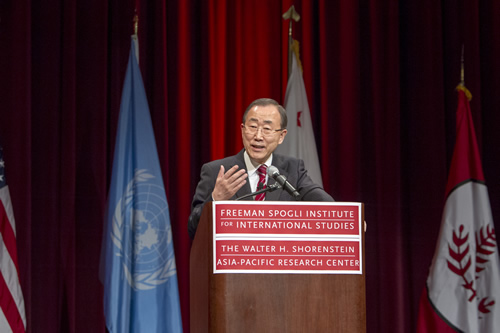Two important speeches were given over the past two weeks. One captured the world’s attention at home and abroad, and the other enjoyed less fanfare, but wove together a picture of the world’s future. One was marking the beginning of a second U.S. presidential term and one was delivered by the world’s top diplomat.
When President Obama outlined his hopes and priorities for the next four years last week, I was struck by two sections that seemed to speak directly to UNA-USA. Early in his speech, he affirmed what most Americans believe about U.S. leadership abroad, “…For the American people can no more meet the demands of today’s world by acting alone…”
But more importantly, President Obama affirmed his administration’s support for two pillars of UNA-USA’s work: multilateral solutions and the importance of human rights. He said:
We will show the courage to try and resolve our differences with other nations peacefully – not because we are naïve about the dangers we face, but because engagement can more durably lift suspicion and fear. America will remain the anchor of strong alliances in every corner of the globe; and we will renew those institutions that extend our capacity to manage crisis abroad [emphasis added], for no one has a greater stake in a peaceful world than its most powerful nation. We will support democracy from Asia to Africa; from the Americas to the Middle East, because our interests and our conscience compel us to act on behalf of those who long for freedom. And we must be a source of hope to the poor, the sick, the marginalized, the victims of prejudice – not out of mere charity, but because peace in our time requires the constant advance of those principles that our common creed describes: tolerance and opportunity; human dignity and justice.
From these words, it is clear the President sees the United Nations and international cooperation as opportunities to come together to address global problems. This aligns with recent polling, which demonstrates that more than 80 percent of Americans think U.S. leadership is vital in these conversations. This is a good sign for UNA-USA and all of the work we do, particularly in the areas of advocacy and human rights.
Almost 3,000 miles away, UN Secretary-General Ban Ki-moon delivered a speech at Stanford University where he put forward key priorities for the world to focus on – sustainable development, sustainable peace, and sustainable human rights for women and young people.

The Secretary-General noted that in 20 years the world will need at least 50 percent more food, 45 percent more energy, and 30% more clean water. He called for national and state action to spur progress in global negotiations with the goal of having a new binding climate framework by 2015.
In Ban’s comments about sustainable peace, he noted that investment in the UN yields an outsized return. The UN is an institution where no one country is footing the bill for its vital work, whether it’s helping train police forces in Iraq and Afghanistan, supporting dozens of elections around the world each year, or helping ensure those in the most need have the life-saving medical attention and supplies they need to lead healthy and productive lives.
Finally, the Secretary-General spoke about the importance of women and young people as the solution. He proudly noted that he has doubled the number of women serving in senior posts at the UN; the UN’s top officials for humanitarian affairs, human rights, and disarmament are women. The UN’s top doctor, top lawyer, and top cop, as well as his chief of staff, are women. He challenged other institutions to follow the UN’s lead and put more women in board rooms and political leadership, helping tap the world’s most underutilized resource.
Young people are a particular source of inspiration for the Secretary-General. With half the world’s population under 25, he emphasized how important the economic and political empowerment of young people is to the future. He linked the outcomes of the Arab Spring, the struggles in Syria, and the UN’s work for peace, justice, and human rights for all as an example of how hard the UN must work to ensure progress is not reversed.
Whether you were in Stanford’s auditorium or one of the more than 20 million who watched President Obama’s inauguration, two common threads bring the two moments together: The UN’s priorities are squarely in the U.S. national interest, and the U.S. needs to leverage the UN’s work and success in this globalized world. Both threads reflect the UNA-USA mission and the beliefs behind our membership.

